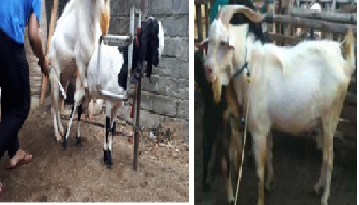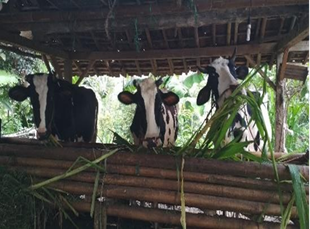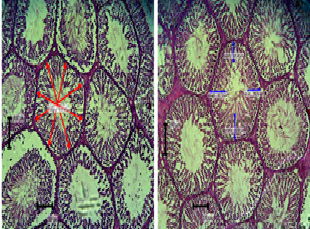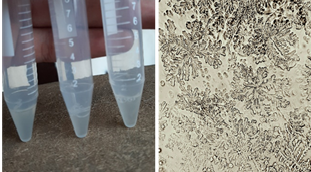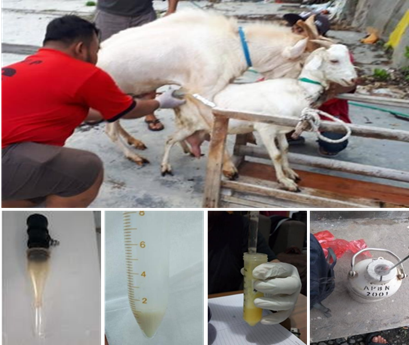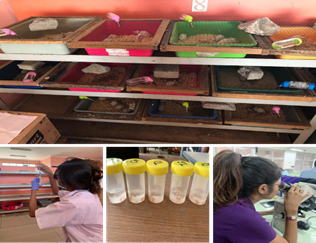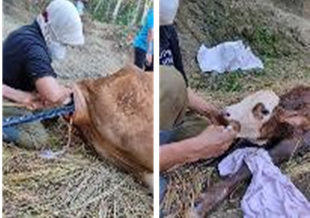The effect of watermelon (citrullus lanatus) rind ethanolic extract on the number of leydig, sertoli, and spermatogenic cells of rat (rattus novergicus) exposed to heat
Downloads
High temperatures lead to oxidative stress, which can disturb spermatogenesis process. Watermelon (Citrullus lanatus) peel contain antioxidant expected to compensate oxidative stress due to heat stress exposure. This study aimed to determine the effect of watermelon rind ethanolic extract on the number of Leydig, Sertoli, and spermatogenic cells of rats exposed to heat (40°C). Twenty rats (Rattus norvegicus) were divided randomly into five groups. In the control group (T0) rats were not exposed to heat nor given the watermelon rind extract. T1, T2, T3, and T4 groups were exposed to heat for an hour daily and orally given placebo (1% Na CMC), 100, 200, and 400 mg/kg BW of watermelon rind extract (in 1% Na CMC). Rats were treated for 52 days, and sacrificed for the testicle collection. Hematoxylin-eosin stained histological slides were prepared for the examination of Leydig, Sertoli and spermatogenic cells. The results showed no significant difference (p >0.05) in the average number of Leydig cells in rats among groups. The number of Sertoli cells and spermatogenic cells of rats exposed to heat (T1) was lower than those of the normal rats (T0 group). The dose of watermelon rind ethanolic extract at 200 mg/kg BW (T3 group) and 400 mg/kg BW (T4) increased (p <0.05) the number of Sertoli and spermatogenic cells. It could be concluded that a dose of 400mg/kg BW of watermelon rind ethanolic extract maintained the number of Leydig cells, Sertoli cells, and spermatogenic cells of rats exposed to heat.
Aldahhan RA, Stanton PG. 2021. Heat stress response of somatic cells in the testis. Mol Cell Endocrinol. DOI: 10.1016/j.mce.2021.111216.
Asadi N, Bahmani M, Kheradmand A, Rafieian-Kopaei M. 2017 The Impact of Oxidative Stress on Testicular Function and the Role of Antioxidants in Improving it: A Review. J Clin Diagn Res. 11: IE01-IE05.
Bunglavan SJ, Chaturvedi VB. 2013. Heat Stress: Impact on Animal Production and Nutritional Strategies for Mitigation of Heat Stress in Dairy Cattle. Livestock Line. March 2013. 46-9.Durairajanayagam D, Agarwal A, Ong C, Prashast P. 2014. Lycopene and male infertility. Asian J Androl. 16: 420-5.
Erhirhie EO, Ekene NE. 2013. Medical Values on Citrullus lanatus Watermelon: Pharmacological Review. Int J Res Pharm Biomed Sci. 4: 1305-12.
Fila WA, Itam EH, Johnson JT, Odey MO, Effiong EE, Dasofunjo K, Ambo EE. 2013. Comparative proximate Compositions of Citrullus Lanatus, Squash Cucurbita Pepo`l and Rambutan Nephelium Lappaceum. Int J Sci Technol. 2: 81-8.
Hansen PJ. 2009. Effects of heat stress on mammalian reproduction. Philos Trans R Soc Lond B Biol Sci. 364: 3341-50.
Kanter M, Aktas C. 2009. Effects of scrotal hyperthermia on Leydig cells in long-term: a histological, immunohistochemical and ultrastructural study in rats. J Mol Histol. 40: 123-30.
Li Z, Tian J, Cui G, Wang M, Yu D. 2015. Effects of local testicular heat treatment on Leydig cell hyperplasia and testosterone biosynthesis in rat testes. Reprod Fertil Dev. 28 DOI: 10.1071/RD14370.
Murray J, Taylor SW, Zhang B, Ghosh SS, Capaldi RA. 2019 SW, Zhang B, Ghosh SS, Capaldi RA. 2003. Oxidative damage to mitochondrial complex I due to peroxynitrite: identification of reactive tyrosines by mass spectrometry. J Biol Chem. 278: 37223-30.
Reynertson KA. 2007. Phytochemical Analysis of Bioactive Constituents from Edible Myrtaceae Fruit, The City University of New York. New York.
Rivlin J, Mendel J, Rubinstein S, Etkovitz N, Breitbart H. 20014. Role of hydrogen peroxide in sperm capacitation and acrosome reaction. Biol Reprod. 70: 518-22.
Rohmah L, Triana IN, Sunarso A, Susilowati S, Hidajati N, Kurnijasanti R. 2018. Pengaruh pemberian ekstrak kulit semangka (Citrullus lanatus) terhadap motilitas dan viabilitas spermatozoa tikus (Rattus norvegicus) dengan paparan suhu panas. Ovozoa 7: 131-6.
Sayuti K, Yenrina R. 2015. Antioksidan Alami dan Sintetik. Andalas University Press. Padang.
Shiraishi K, Matsuyama H, Takihara H. 2012. Pathophysiology of varicocele in male infertility in the era of assisted reproductive technology. Int J Urol. 19: 538-50.
Sikka SC. 2001. Relative impact of oxidative stress on male reproductive function. Curr Med Chem. 8: 851-62.
Umar SH, Queljoe ED, Tendean L. 2015. Pengaruh pemberian ekstrak kulit buah Manggis (Garnicinia mangostana L.) terhadap kualitas spermatozoa Wistar jantan (Rattus norvegicus) yang diberi paparan suhu panas. J e-Biomedik 3: 670-5.
Wang Z, Xu X, Li JL, Palmer C, Maric D, Dean J. 2019. Sertoli cell-only phenotype and scRNA-seq define PRAMEF12 as a factor essential for spermatogenesis in mice. Nat Commun. 10: 5196. DOI: 10.1038/s41467-019-13193-3.
Werdhasari A. 2014 . Peran Antioksidan Bagi Kesehatan. Jurnal Biotek Medisiana Indonesia 3: 59-68.
Ovozoa by Unair is licensed under a Creative Commons Attribution-ShareAlike 4.0 International License.
1. The journal allows the author to hold the copyright of the article without restrictions.
2. The journal allows the author(s) to retain publishing rights without restrictions
3. The legal formal aspect of journal publication accessibility refers to Creative Commons Attribution Share-Alike (CC BY-SA).
4. The Creative Commons Attribution Share-Alike (CC BY-SA) license allows re-distribution and re-use of a licensed work on the conditions that the creator is appropriately credited and that any derivative work is made available under "the same, similar or a compatible license”. Other than the conditions mentioned above, the editorial board is not responsible for copyright violation.





























